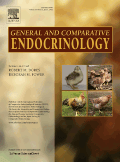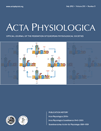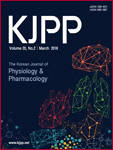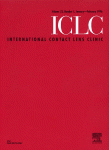
Physiological Reports
Scope & Guideline
Advancing the Frontiers of Physiology
Introduction
Aims and Scopes
- Cardiovascular Physiology:
Research in this area covers studies on heart function, vascular dynamics, and the effects of various interventions (e.g., exercise, pharmacological agents) on cardiovascular health. - Metabolic Physiology:
This scope includes investigations into energy metabolism, insulin sensitivity, and the effects of diet and exercise on metabolic processes in different populations. - Respiratory Physiology:
Papers often focus on lung function, the effects of environmental factors on respiratory health, and mechanisms of respiratory diseases, including COVID-19-related studies. - Exercise Physiology:
This area explores the physiological adaptations to different forms of exercise, including resistance training, aerobic exercise, and high-intensity interval training. - Neurophysiology:
Research in neurophysiology addresses the interactions between neural function and physiological responses, including studies on pain perception, autonomic function, and cognitive effects related to physical activity. - Renal Physiology:
Studies focus on kidney function, the impact of various treatments on renal health, and the relationship between kidney function and systemic physiology. - Cellular and Molecular Physiology:
This includes research on the cellular mechanisms underlying physiological responses, such as cellular signaling pathways, gene expression, and mitochondrial function. - Comparative Physiology:
Research that compares physiological processes across different species or conditions to understand evolutionary adaptations and mechanisms.
Trending and Emerging
- Long COVID and Post-Acute Sequelae:
An increase in studies focusing on the physiological impacts of COVID-19, particularly long-term effects and post-acute sequelae, highlights the urgency and relevance of understanding this emerging health issue. - Gut Microbiome and Metabolism:
Research exploring the connections between the gut microbiome, metabolic health, and exercise has gained traction, reflecting a growing recognition of the microbiome's role in overall health. - Sex Differences in Physiology:
There is a rising interest in understanding how sex influences physiological responses, including differences in disease susceptibility and treatment responses. - Environmental Physiology:
Research focusing on the physiological adaptations to environmental stressors, such as altitude, heat, and pollution, has increased, especially in the context of climate change and its health implications. - Biomarkers for Disease Prediction:
Emerging studies are increasingly utilizing biomarkers to predict disease risk and assess physiological responses in various populations, reflecting a trend towards personalized medicine. - Innovative Therapeutic Approaches:
Research on novel therapeutic strategies, including gene therapy, stem cell therapy, and new pharmacological agents, is becoming more prominent as the field seeks to address complex health issues. - Exercise and Mental Health:
There is a growing body of literature investigating the effects of physical activity on mental health outcomes, emphasizing the importance of exercise in psychological well-being.
Declining or Waning
- Traditional Pharmacology Studies:
Research centered on the pharmacological impacts of traditional drugs on physiological systems appears to be decreasing, possibly due to a shift towards more innovative therapeutic approaches and a focus on personalized medicine. - Basic Physiology without Clinical Relevance:
There seems to be a decline in studies focused solely on basic physiological mechanisms without direct clinical applications, as the journal increasingly prioritizes research with translational relevance. - Animal Models of Disease:
While animal research remains crucial, there is a trend towards fewer studies focusing on basic animal models of disease, as researchers emphasize the need for human-relevant findings and clinical applications. - Single-Factor Studies:
Research examining the effects of single variables in isolation (e.g., one drug, one type of exercise) is declining as the field moves towards more integrative approaches that consider multiple interacting factors.
Similar Journals

CHINESE JOURNAL OF PHYSIOLOGY
Elevating the discourse in medical physiology.CHINESE JOURNAL OF PHYSIOLOGY, published by WOLTERS KLUWER MEDKNOW PUBLICATIONS, has been a vital resource since its inception in 1971, catering to the expansive field of physiology. Operating out of Taiwan, this journal addresses critical research in both general and medical physiology, providing a platform for innovative studies that contribute significantly to the understanding of biological processes. With an emphasis on disseminating high-quality, peer-reviewed articles, it holds a Q4 ranking in Physiology and a Q3 ranking in Medical Physiology as of 2023, reflecting its commitment to advancing physiological science. The ISSN for this journal is 0304-4920 and the E-ISSN is 2666-0059. While access options are not available as open access, researchers and professionals can still benefit from its valuable insights. Notably, it ranks #78/113 in Medicine - Physiology and #159/193 in Biochemistry, Genetics, and Molecular Biology - Physiology on Scopus, indicating its growing influence in the scientific community. We invite researchers, professionals, and students alike to explore the wealth of knowledge featured within the pages of the CHINESE JOURNAL OF PHYSIOLOGY.

Frontiers in Physiology
Transforming understanding of physiological processes.Frontiers in Physiology, published by FRONTIERS MEDIA SA, is a leading open-access journal that has been at the forefront of physiological research since its inception in 2010. As a reputable publication based in Switzerland, it aims to foster the dissemination of groundbreaking findings across various domains of physiology, engaging a global audience of scholars and practitioners. With a commendable Q2 ranking in the fields of both general physiology and medical physiology for 2023, this journal stands out in its field, achieving a significant Scopus rank of #32/113 in medical physiology and #58/193 in biochemistry, genetics, and molecular biology. Frontiers in Physiology not only commits to maintaining high scholarly standards but also ensures that all its articles are freely accessible, thereby promoting collaborative knowledge exchange. With a clear focus on advancing our understanding of physiological processes, the journal plays a crucial role in the development of innovative approaches to health and disease, making it an essential resource for researchers, professionals, and students alike.

GENERAL AND COMPARATIVE ENDOCRINOLOGY
Connecting researchers through impactful endocrine research.GENERAL AND COMPARATIVE ENDOCRINOLOGY, published by Academic Press Inc Elsevier Science, is a distinguished journal that has been at the forefront of endocrine research since its inception in 1961. With an ISSN of 0016-6480 and an E-ISSN of 1095-6840, this journal caters to a diverse audience, including researchers, professionals, and students in the fields of animal science, zoology, and endocrinology. It holds a prestigious Q1 ranking in Animal Science and Zoology and is recognized in the Q3 quartile for Endocrinology, indicating its significant contribution to advancing scientific knowledge. The journal is also well-regarded within the Scopus rankings, with impressive placements in multiple categories, highlighting its impact and relevance in the academic community. By focusing on comparative analyses and fostering a deeper understanding of hormone function and regulation across species, GENERAL AND COMPARATIVE ENDOCRINOLOGY aims to bridge gaps in knowledge and stimulate innovative research paradigms. While it does not currently offer Open Access, the journal remains committed to high-quality peer-reviewed content, making it an essential resource for anyone engaged in this vital field of study.

Acta Physiologica
Fostering Collaboration in Physiological SciencesActa Physiologica is a premier, peer-reviewed journal published by WILEY, dedicated to the dissemination of high-quality research across the field of physiology. With an impressive impact factor reflective of its Q1 category ranking in Physiology for 2023, this journal is a vital resource for researchers, professionals, and students alike, seeking to explore the complexities of biological systems. The journal is indexed with a commendable Scopus rank of #18 out of 193 in its category, placing it within the top 10% of its field, which underscores its influence and citation frequency within the academic community. Acta Physiologica publishes a variety of articles that address fundamental physiological concepts, innovative methodologies, and cross-disciplinary research. With its open access options, the journal ensures that cutting-edge knowledge is readily accessible, fostering an environment of collaboration and advancement in the study of physiology. Spanning from 2006 to 2024, the journal continues to be at the forefront of physiological research and education, encouraging the global sharing of knowledge through its comprehensive content.

Current Research in Physiology
Exploring the Depths of Physiology ResearchCurrent Research in Physiology is an esteemed academic journal published by Elsevier, aimed at advancing the field of physiology through high-quality research contributions. Since its inception in 2019, the journal has provided a platform for innovative studies and reviews, addressing both fundamental and applied aspects of physiology across various biological systems. With its ISSN 2665-9441, it operates under a non-open access model, ensuring rigorous peer review while also fostering a broad readership. The journal has been classified in the Q3 category for both Physiology and Medical Physiology as of 2023, reflecting its growing influence and relevance, as evidenced by its Scopus rankings within the respective fields. Designed for researchers, clinicians, and students alike, Current Research in Physiology is committed to disseminating cutting-edge research that informs both academic inquiry and clinical practice, paving the way for future advancements in physiological science.

Comprehensive Physiology
Pioneering Insights into Physiological MechanismsComprehensive Physiology is a premier journal published by WILEY, dedicated to the profound exploration of physiological science. With an impact factor that underscores its significance within the field, this journal serves as a pivotal resource for researchers, professionals, and students alike, ensuring access to cutting-edge studies and reviews that span various domains of physiology. It stands proudly in the Q1 category across multiple subfields including Medicine (miscellaneous), Physiology, and Medical Physiology, reflecting its outstanding position within the scientific community. Evaluated within prestigious bibliometric ranks, it boasts an impressive Scopus ranking, placing it in the 12th percentile for medical physiology and 23rd percentile in biochemical, genetic, and molecular physiology. As it converges from 2011 to 2024, Comprehensive Physiology continues to foster a platform for innovative discoveries and collaborative exchanges, thereby contributing significantly to the advancement of medical knowledge and understanding of physiological processes.

Current Opinion in Physiology
Advancing Insights in the Dynamic World of PhysiologyCurrent Opinion in Physiology, published by Elsevier, is a leading journal dedicated to the dynamic field of physiology. With an E-ISSN of 2468-8673, this journal provides a platform for the latest insights and perspectives, reflecting the evolving landscape of physiological research. Operating from the United Kingdom, the journal holds a respectable impact factor and is ranked Q2 in both general physiology and medical physiology categories, highlighting its prominence among the global academic community. With Scopus rankings placing it in the 64th and 60th percentiles within its respective categories, Current Opinion in Physiology serves as an essential resource for researchers, professionals, and students eager to stay informed about innovative theories and emerging trends in physiology. The publication emphasizes high-quality reviews that summarize current knowledge and future directions, ensuring readers gain valuable insights applicable in both clinical and research settings.

KOREAN JOURNAL OF PHYSIOLOGY & PHARMACOLOGY
Connecting researchers and professionals in the heart of pharmacology.Welcome to the Korean Journal of Physiology & Pharmacology, a pivotal academic platform dedicated to advancing the disciplines of physiology and pharmacology. Published by the esteemed Korean Journal of Physiology & Pharmacology, this journal has been disseminating valuable research findings since its inception in 1997 and continues to be a critical resource for researchers, professionals, and students in South Korea and beyond. With an ISSN of 1226-4512 and E-ISSN of 2093-3827, it offers insights into various aspects of drug action and physiological mechanisms. Although this journal currently does not subscribe to Open Access, it plays a vital role in bridging the gap between experimental and clinical studies, receiving commendations for its quality. In the 2023 Scopus rankings, it is notably positioned in the Q3 quartile for Pharmacology and Q4 for Physiology, reflecting its commitment to excellence. As the journal converges towards its comprehensive coverage in 2024, it remains a cornerstone for those looking to engage deeply with critical developments in these fields.

JOURNAL OF EVOLUTIONARY BIOCHEMISTRY AND PHYSIOLOGY
Illuminating Evolutionary Adaptations Through Biochemical ResearchJOURNAL OF EVOLUTIONARY BIOCHEMISTRY AND PHYSIOLOGY, published by PLEIADES PUBLISHING INC, is a pivotal periodical that delves into the intricate relationships between biochemical processes and evolutionary dynamics. With its ISSN 0022-0930 and E-ISSN 1608-3202, this journal serves as a comprehensive platform for researchers, professionals, and students dedicated to understanding the physiological adaptations and biochemical mechanisms influenced by evolutionary pressures. Although it is not an open access journal, it offers valuable insights across its historically significant coverage spanning from 1972 to 2017, making it an essential resource for those working in agricultural, biological, and molecular sciences. Despite its current Scopus rankings revealing limited visibility within its fields, the journal remains committed to fostering scholarly dialogue and advancing knowledge in the realm of evolutionary biochemistry, especially for those exploring the ecological, genetic, and integrative physiological aspects of life.

AMERICAN JOURNAL OF PHYSIOLOGY-ENDOCRINOLOGY AND METABOLISM
Driving innovation in diabetes and metabolic research.American Journal of Physiology-Endocrinology and Metabolism, published by the American Physiological Society, stands as a leading platform for disseminating high-quality research in the fields of endocrinology, diabetes, and metabolism, as well as general physiology. With an impressive impact factor placing it within the Q1 category across multiple relevant disciplines (Endocrinology, Diabetes and Metabolism; Physiology; and Medical Physiology), this journal reflects its authoritative position in the scientific community. Spanning from 1980 to 2024, the journal consistently publishes groundbreaking studies and significant findings that advance our understanding of hormonal regulation and metabolic processes. Although it does not currently offer open access, it provides valuable resources for researchers, professionals, and students alike, eager to stay at the forefront of advancements in physiological sciences. Addressed in Rockville, Maryland, its commitment to excellence and rigorous peer review ensures that every article contributes essential insights to the field.